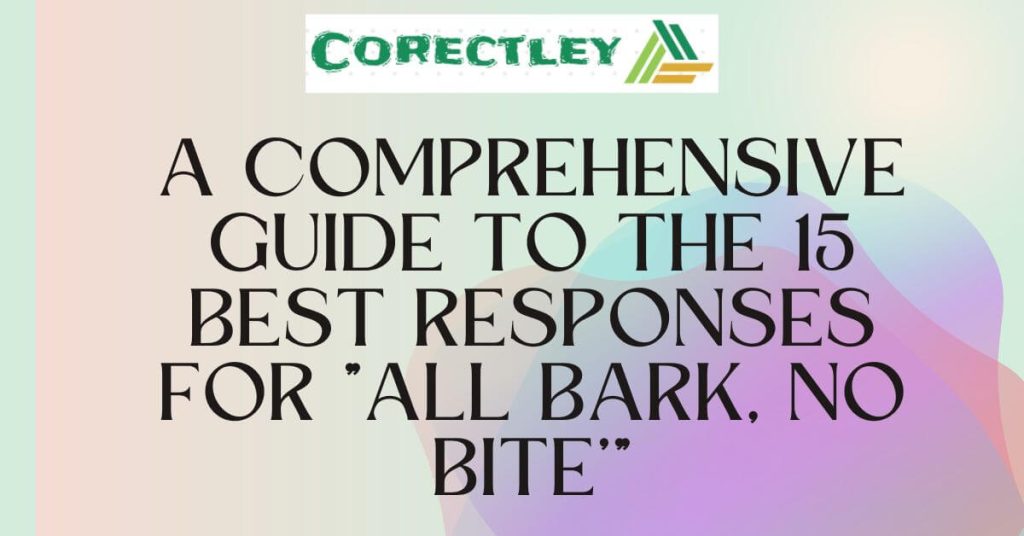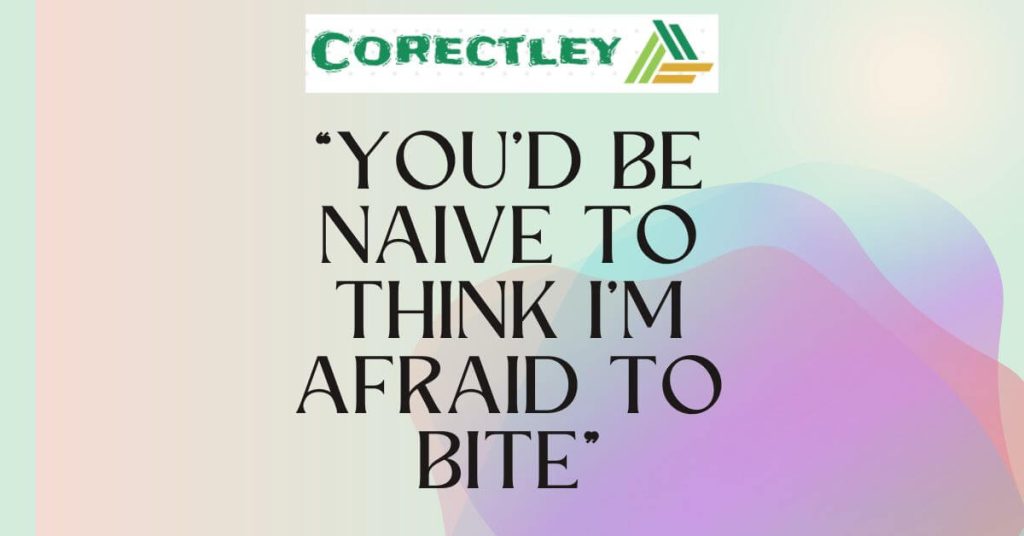Is it true or not that you are searching for ways of answering “All Bark, No Bite”? It is a colloquial articulation somebody shares with you when they think you whine and compromise an extraordinary arrangement however wouldn’t even come close to making a move.
From the wealth of my repartee, I have recorded probably the best responses for when somebody tells you “All Bark, No Bite” in a discussion.
The best response to “All Bark, No Bite” is to say, “You would rather not see my chomp.” This is a powerful and scary answer since it suggests that your activities will be more significant in demonstrating your capacity or plan than your words.
Other shrewd rebound choices you can consider incorporate “My activities will talk stronger than my words” and “I like to save my bite for the people who merit it.”

But what does “all bark, no bite” mean?
“All bark and no bite” is a figurative articulation to excuse somebody who gripes or compromises boisterously yet withdraws when stood up to or expected to make a move.
For instance, a person is harmless when they take steps to sue you however never do as such.
The expression has been being used since around the turn of the nineteenth hundred years, especially to summon the picture of a yapping canine that doesn’t ultimately nibble to coordinate with his antagonism.
Different varieties of the articulation incorporate “all discussion and no activity,” “all hot air and no assemble,” and “his bark is more terrible than his chomp,” all of which mean the same thing.
In any case, “all bark, no bite” could likewise be utilized thoughtfully. For instance, to depict a guiltless person who looks undermining yet would never pose a threat to anyone truly. In any case, this setting isn’t now and again present.
Now, here are the best 15 replies to give to “all bark, no bite “
1. “You don’t want to see my bite”
“You don’t want to see my bite” is the savviest answer to use in this present circumstance. This response inspires your certainty against the person’s work to make light of you through that articulation. The person who is attempting to dismiss you as “all bark and no bite” will feel intimidated by your response.
Statement: You’re bluffing. All bark no bite
Your response: You don’t want to see me bite. Careful.
2. “I prefer to save my bite for those who deserve it.”
“I prefer to save my bite for those who deserve it” is one more clever method for returning at somebody, particularly when they utilize the articulation to whitewash you. It permits you to communicate how self-controlled you are in fewer words without sounding protective.
“For those who deserve it” is dependably an effective method for turning the tables and making them the little person in the discussion. For instance:
Statement: Your bark is worse than your bite.
Your response: That’s funny because I prefer to save my bite for those who deserve it.
3. “My action will speak louder than my words, then”
“Actions speak louder than words” is a deep-rooted saying you can use to maturely answer. It is a strategy for implying that your “bite,” or action, will have a greater impact than your words (your bark). With this answer, it implies they have no clue about what’s coming in their direction assuming they continue to underrate you.
Statement: That’s all you do. All bark no bite
Your response: Since you don’t want to listen, my actions will speak louder than my words.
4. “I only bite when it’s for a good reason.”
“I may not always bite, but when I do, it’s for a good reason” is one more effective method for answering, as it implies you’d prefer to make an exceptional move just for the right reasons and when it’s fundamental.
You shouldn’t be forced into a foot-in-mouth situation by someone else’s opinion of you.
Statement: You are just a bark-no-bite
Your response: I may not always bite, but when I do, it’s for a good reason.
5. “It’s better to be known for barking than biting”
At times, the best rebound or response to a contemptuous assertion is to draw out the silver lining. This response is a shrewd method for stressing why you like to undermine, caution, or interact with things before making an extraordinary move like a grown-up should.
What’s more terrible? known for their barking or hostility? This response can also be used to control the conversation.
Statement: All bark, no bite—that’s what you are.
Your response: It’s better to be known for barking than biting, don’t you think?
6. “I don’t need to bite when my bark can accomplish the same thing.”
This clever response demonstrates that you are capable of achieving your goals even before you act. All bark becomes respectable when your mouth is your weapon and your words are your slugs. So why bite when your bark can achieve the same thing?
Statement: You’re all bark no bite
Your response: I don’t need to bite when my bark can accomplish the same thing. My mouth’s a weapon.
7. “I bite harder than I bark”
Now and again, while attempting to dismay the person endeavoring to underrate you, the less the words, the better. This response suggests that your behavior is not something they want to see, so they should take your warning, threat, or intention seriously.
Indeed, looking at the situation objectively, this response can be thought of as “barking,” so you ought to be prepared to make that move assuming they minimize you further.
Statement: You’re all bark no bite
Your response: I bite harder than I bark. Don’t try me.
8. “You’d be naive to think I’m afraid to bite”

This is a sound answer to tell the person you will finish the activity if they continue to put you down. It infers that the person comes up short on experience to feel that you won’t coordinate your words with activity when gone up against.
You can likewise involve this response in a contentious discussion as a shrewd rebound
Statement: I know your type. All bark no bite
Your response: You’d be naive to think I’m afraid to bite. Do you want to test that theory?
9. “Rather measure me by my actions, not words.”
Our actions demonstrate our commitments, character, and beliefs. So when somebody calls all of you to bark and no chomp, you can answer by repeating your expectation to be estimated by your activities, not your words or contemplations.
Statement: You are all bark and no bite. Keep bluffing.
Your response: I prefer to be measured by my actions, not my words.
It shows you are delicate about being responsible for the aftereffects of your activities and in addition to your words, which is the reason you’d carve out an opportunity to talk before seeing everything through to completion.
10. “I’d rather be all bark and no bite than all bite and no bark.”
This is a sharp response that will work in any specific circumstance. ” All bark, no chomp” signifies you have a motor mouth yet seldom finish activities, yet better than somebody quick to activity without a mental ability to utilize his words before activity.
Statement: All bark, no bite—that’s who you are.
Your response: I’d rather be all bark and no bite than all bite and no bark.
It is a brilliant method for turning the table around.
11. “I’m not all bark; I just know how to make my presence known.”
You are being heard, giving consideration, and showing certainty by spreading the word. This is a shrewd answer that permits you to convey your character: decisive, certain, and eye-catching.
Statement: All bark, no bite—that’s who you are.
Your response: “I’m not all bark; I just know how to make my presence known.” And that’s why you’ll take me seriously.
12. “As long as my bark makes a big impact.”
All things considered, you will make an exceptional move. Before then, at that point, you are certain that your words will motivate, yet that doesn’t make all of you bark and chomp. This response astutely communicates a lot in fewer words.
13. “You don’t want to mess with me.”
“You don’t want to mess with me” is one more method for answering, summoning terrorizing and sounding certain. It shows you are prepared to erupt on the off chance that the person continues to make light of you.
14. “I may not bite, but I can still defend myself and others.”
The whole point of being “all bark, no bite” is to defend yourself or someone else or say that you intend to do something before doing it. Along these lines, this response assists you with passing on that message.
15. “I don’t always bite, but when I do, it’s because I’ve been provoked.”
Outrage the board is no joking matter, and you can get that as a component.
“I don’t always bite” means you have self-control, and “and when I do, it’s because I’ve been provoked” suggests that the person will see the opposite side of you when you get incited.